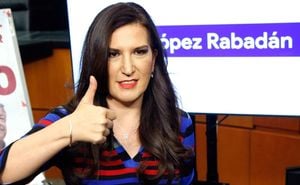At the heart of the 34th Sharjah Theatre Days, discussions have flourished around the urgent need to address the evolution of theatre criticism within the Arab world, intertwining it with the complex socio-political backdrop of the region. A recent session held on February 24, 2025, titled "What Role Do Critics Play in Documenting the March of Egyptian Theatre?" hosted by Dr. Ibrahim Al-Hosseini, underscored the integral relationship between the political climate and the narratives shaped by critics.
The event, moderated by Dr. Walid Al-Zaabi and attended by prominent theatre figures including Ahmed Bourhaima, Director of Theatre at the Sharjah Culture Department, aimed to highlight how the practices and perspectives of theatrical critics have shifted over decades. Dr. Al-Hosseini emphasized, "Theatre criticism has never been decoupled from political and social contexts, as critics have long sought to analyze and interpret artistic phenomena within their temporal and contextual frameworks."
Tracing the arc of criticism from the mid-20th century to the present, Dr. Al-Hosseini noted significant transformations following Egypt's 1952 revolution. The 1960s, he argued, witnessed the state taking on a pivotal role, where the production of theatrical works mirrored the socialist ideologies becoming prevalent at the time.
“After the 1967 defeat, theatre criticism began to reevaluate traditional notions of heroism and the official narrative,” Dr. Al-Hosseini remarked, drawing attention to how political events influenced critics’ discourse. This led to the emergence of new questions around intellectual responsibility, eleviating the discussion beyond mere artistic critique to socio-political accountability.
With the onset of the era of economic openness known as "infitah" during the 1970s, the focus of critics began to branch out. During this time, they started addressing the impacts of the rising capitalist pressures on art and culture. Yet as the dynamics of the region evolved, Dr. Al-Hosseini cautioned about the widening gap between deep academic scrutiny and the rapid, often superficial, analyses popularized by the press.
Given these transformations, one of the pressing challenges facing contemporary Arab theatre criticism today emerged as the absence of proper archival documentation. Dr. Al-Hosseini noted, "One of the key challenges facing contemporary Arab theatre criticism today is the absence of proper archival documentation, which has led to the loss of much important research effort." This void hinders the capacity of critics to enrich the cultural fabric with historical continuity and narrative depth.
Further complicacies arise from the global cultural trends infiltrated by Western theatrical styles—an evolution underscored by the necessity for Arab theatre to synchronize with modern theatrical movements. Dr. Al-Hosseini declared, “Global cultural trends significantly influence Arab theatre, which is now striving to keep pace with modern theatrical styles.” The concern lies not only with adaptation but with ensuring the preservation of local cultural identities amid these influences.
Participants of the session provided valuable insights, reinforcing the necessity of interdisciplinary projects aimed at documenting the history of Arab criticism. The discourse also included the rise of digital media, which has started to provide new avenues for critics to share their insights beyond conventional printed formats. Such developments represent hope for revitalizing the often neglected realms of theatrical documentation.
Echoing similar sentiments, many critics called for enhanced collaboration between critics and theatre practitioners, encouraging the establishment of initiatives meant to reinforce the artistic atmosphere of Arab theatre comprehensively. Such synergies are seen as pivotal for addressing contemporary challenges—as critics navigate between tradition and modernity to engage dynamically with changing audience expectations.
With concluding remarks emphasizing the importance of sustaining the dialogue on the role of theatre criticism, it is evident from recent discussions at the Sharjah Theatre Days just how influential these insights can be—rooted deeply within the socio-political landscapes they are built upon.



